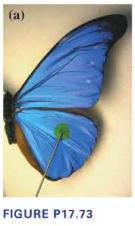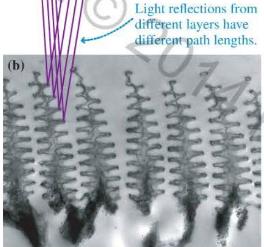The change in color when acetone is placed on the wing is due to the difference between
Question:
The change in color when acetone is placed on the wing is due to the difference between the indices of refraction of ace-
tone and air. Consider light of some particular color. In acetone, A. The frequency of the light is less than in air.
B. The frequency of the light is greater than in air.
C. The wavelength of the light is less than in air.
D. The wavelength of the light is greater than in air.
The brilliant blue color of a blue morpho butterfly is, like the colors of peacock feathers, due to interference. Figure P17.73a shows an easy way to demonstrate this: If a drop of the clear solvent acetone is placed on the wing of a blue morpho butterfly, the color changes from a brilliant blue to an equally brilliant green-returning to blue once the acetone evaporates. There would be no change if the color were due to pigment.

A cross section of a scale from the wing of a blue morpho butterfly reveals the source of the butterfly's color. As Figure P17.73b shows, the scales are covered with structures that look like small Christmas trees. Light striking the wings reflects from different layers of these structures, and the differing path lengths cause the reflected light to interfere constructively or destructively, depending on the wavelength. For light at normal incidence, blue light experiences constructive interference while other colors undergo destructive interference and cancel. Acetone fills the spaces in the scales with a fluid of index of refraction \(n=1.38\); this changes the conditions for constructive interference and results in a change in color.
Step by Step Answer:

College Physics A Strategic Approach
ISBN: 9780321907240
3rd Edition
Authors: Randall D. Knight, Brian Jones, Stuart Field





